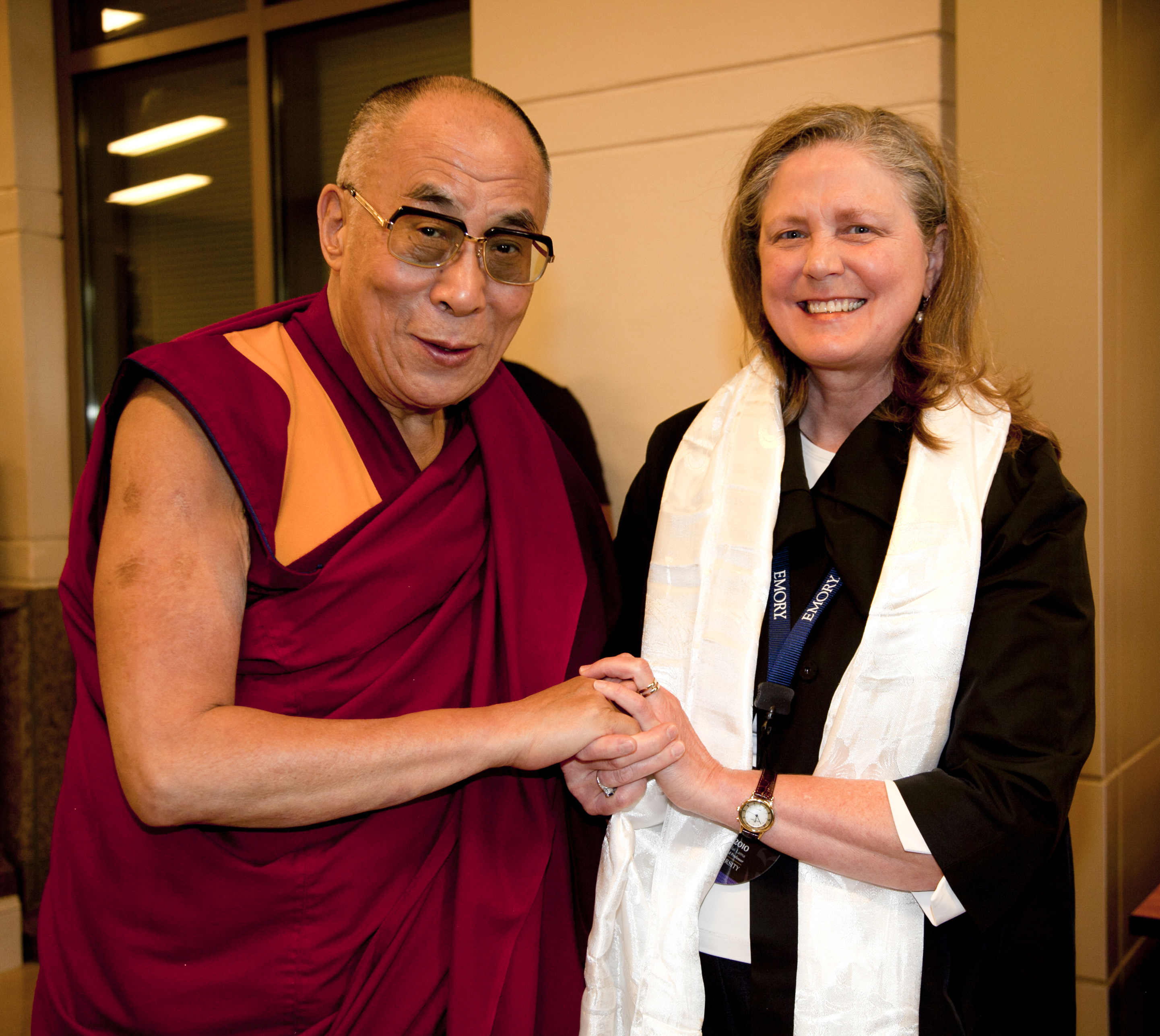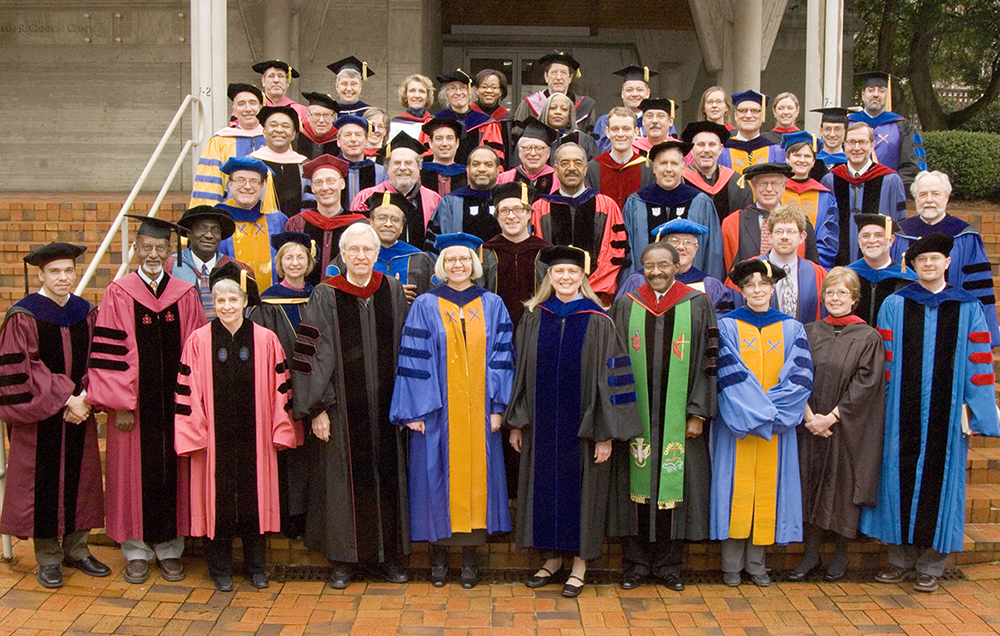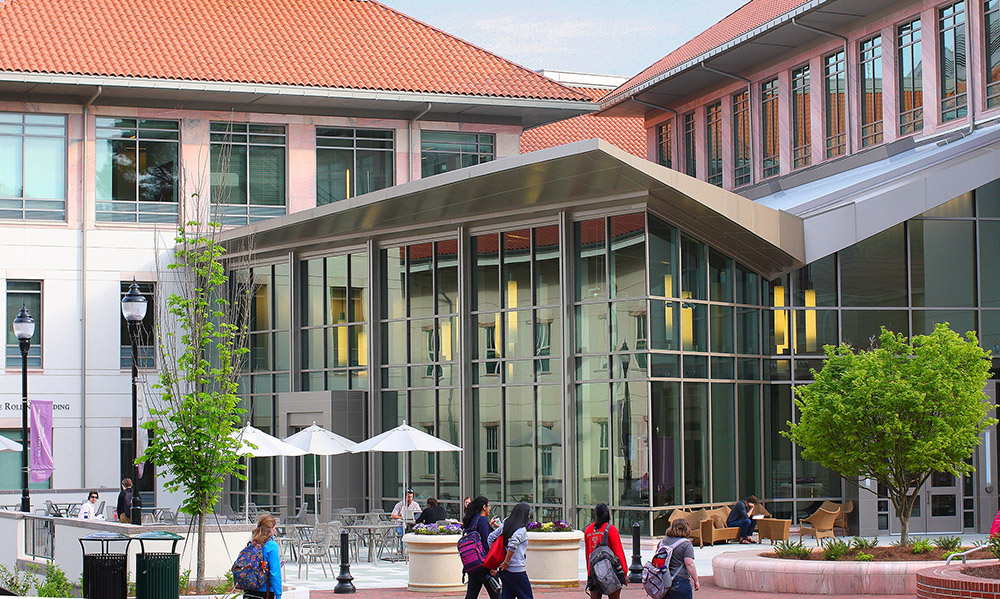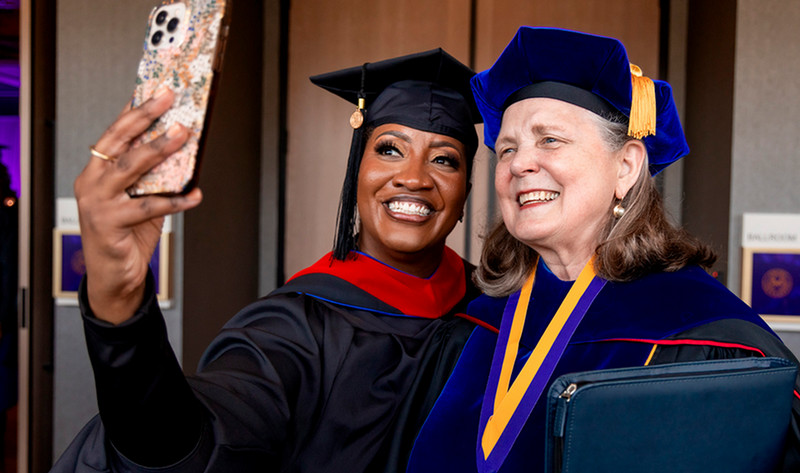When Jan Love, the Mary Lee Hardin Willard Dean of Candler School of Theology, recalls her first big challenge as dean, you might guess she would point to some of the “firsts” she navigated in coming to Emory in 2006. After all, Love is the first woman dean of Candler, the first unordained leader of the school, the first without a theology degree. A second guess might be that she was daunted by the magnitude of the job, as she was taking up the reins of one of United Methodism’s flagship seminaries — one of only five embedded in a top-tier research university.
Yet, when pressed recently to recall her biggest initial hurdle as dean, Love immediately quips, “navigating Atlanta traffic!”
As is often the case, there’s a story behind her words. In retrospect, it seems obvious that then-Emory President James Wagner and former Provost Earl Lewis made a wise — even visionary — choice to name Love as Candler’s ninth dean. But at the time of her appointment, some key stakeholders still needed more convincing. Love’s first job as dean was to meet with her skeptics.
So as a newly appointed dean and new to Atlanta, Love was driving to meet with the Rev. Dr. Don Harp Jr. 66T, then pastor of Peachtree Road United Methodist Church, and someone who had expressed surprise at Emory’s unconventional choice. She recalls being stuck in traffic, exasperated, and phoning Harp to apologize for her lateness, hoping it would not be interpreted as rudeness.
It wasn’t. Harp, unfazed, said, “Welcome to Atlanta!” They laughed, and when she finally did arrive, the two talked easily, forging the beginning of a mutually supportive relationship.
“People who were early detractors came around because of Jan’s willingness to go meet them where they are,” says Mathew Pinson, former chief advancement officer at Candler, now Emory assistant vice president for operations and strategic initiatives in the Office of the Executive Vice President for Business and Administration. “The hallmark of her style is unwavering commitment to achieve some measure of understanding and establish good relationships with people.”
A gift for connecting
Love’s instinct for reaching out to others, whether across town or across continents, came early. A native of Alabama and daughter of a Methodist minister (and graduate of Candler, the late James Neal Love 56T), Love was still in high school when she began serving as a lay leader of The United Methodist Church (UMC) in state, national and international arenas.

His Holiness the Dalai Lama with Dean Love during his 2010 visit to Emory University.
Emory Photo/Video
“I first met Jan Love at an ecumenical meeting when we were barely out of college,” recalled Tom Frank at the time of Love’s appointment. A member of the dean search advisory committee that nominated Love, Frank, now retired from the faculty at Wake Forest University, said that “even then, she was an adventurer, curious about the world’s peoples and eager to know the world’s cultures.”
Love followed her devotion to international understanding both in her pursuits as a United Methodist layperson and as an accomplished academic. After completing an undergraduate degree with honors from Eckerd College, and master’s and PhD degrees in political science/international relations from The Ohio State University, she served on the faculty of the University of South Carolina for 22 years in the departments of religious studies and government and international studies.
A highly regarded scholar of world politics, Love’s teaching and writing focused on the intersection of religion and politics, conflict transformation, and globalization. Her work in facilitating constructive relationships among people with deeply held differences and her work on issues of racial justice are reflected not only in her teaching, but in her books,“The U.S. Anti-Apartheid Movement: Local Activism in Global Politics” (Praeger, 1985) and“Southern Africa in World Politics: Local Aspirations and Global Entanglements” (Westview, 2005).
Love left academia in 2004 for full-time denominational leadership as chief executive officer of United Methodist Women, the largest denominational organization for women, with approximately 800,000 members who raise roughly $20 million annually for projects related to women, children and youth in the United States and over 60 countries.
And then came a phone call from a representative of Emory.
Coming to Candler
Love was not only the choice of President Wagner and Provost Lewis, but popular with Candler’s faculty as well, says Ian McFarland, Robert W. Woodruff Professor of Theology, who served as associate dean of academic affairs under Love’s leadership from 2011-2015.
“One thing that was immediately clear was her ability to advocate for Candler both in the university and in the church,” he says.
McFarland found that Love was someone “willing to listen but also not afraid to make decisions when she thought she had the information she needed. She has the ability to take in feedback and input and process that in a way that results in good outcomes for the institution. Candler has flourished under her tenure.”

The Candler faculty at Dean Love’s installation in January 2007.
Emory Photo/Video
Often, that meant thinking creatively, using strengths and assets in new ways.
“I credit Jan and characterize her as a kind of theological globalist who sees the church in the larger global context and not just in what’s happening in America,” says Robert M. Franklin Jr., the James T. and Berta R. Laney Professor in Moral Leadership at Candler.
A member of Candler’s faculty from 1989-1995 before becoming president of Morehouse College, Franklin credits Love for reaching out to him about a new program in moral leadership and convincing him to return to Candler to spearhead it in 2014. The initiative has taken Franklin and Candler students from South Africa to South Korea to study moral leadership from a global perspective.
Franklin also credits Love for “advancing the values of diversity, inclusion, and internationalism on a number of levels,” not only in terms of faculty appointments, student recruitment and new programs, but in her own distinct way of communicating these ideas. “It has been through the power of her ideas and her persuasive communication style that skepticism has turned into confidence,” he says.
“Jan was open to fundamental innovation,” says professor of church history Jonathan Strom, associate dean of faculty and academic affairs from 2015-22 and Candler’s next dean. He points to Candler’s $5 million grant from Lilly Endowment Inc. in 2022 as an example of Love’s leadership in working with him and other faculty to secure funding for a set of initiatives to create an interconnected continuum of offerings to educate pastoral leaders. These initiatives expanded Candler’s scope and influence, establishing new partnerships and entry points for the school.
An expansive vision
At an event this spring celebrating Love’s legacy at Candler, Dan Aleshire, former executive director of the Association of Theological Schools, cited the importance of vision in leadership.
“It’s not so much the [dean’s] job to get a vision for the school, as to discern one,” said Aleshire. That vision should be rooted in the school’s history, alert to the needs of the church and the world, and expressive of high aspirations for the future, he said.
“Jan Love’s tenure as dean has never lacked for vision,” said Aleshire. He cited “the vision to complete projects that had begun but not finished, like the Rita Anne Rollins Building; to undertake tasks that everyone knew were needed but had not been executed, like the new building for Pitts Theology Library; raising funds for student scholarships and faculty endowments; enhancing the connections between Candler and congregations; continuing the Black Studies Program; and establishing The Candler Foundry and La Mesa Academy programs to make excellent theological education available to laity and persons without the academic credentials for admission to Candler’s degree programs.”
In short, said Aleshire, Love “has dramatically expanded the edges without thinning the center.”
By any measure, Candler’s accomplishments with Love at the helm have met squarely with the present and often anticipated the future. Among them:

The Rita Anne Rollins Building and a new building for Pitts Theology Library were completed under Love’s leadership. The two buildings are connected by a two-story glass atrium.
M. Patrick Graham/Candler
- Completing a new 128,000-square-foot building complex
- Launching three new degree programs — the DMin, MARL and MRPL — and five dual degree programs
- Adding online and hybrid options to serve a wider base of students
- Guiding the faculty through a generational shift, hiring 75% of current full-time faculty and continuing Candler’s tradition of scholarly excellence
- Cultivating a more diverse faculty and student body, which this year reached 41 and 44 percent persons of color, respectively
- Creating 7 of the school’s 17 funds for endowed positions, including professorships and an endowed deanship
- Stewarding a vital relationship with The United Methodist Church
- Enhancing student opportunities for international engagement and experiential learning
- Establishing a deeper institutional commitment to Candler’s worship life and student spiritual formation
“There are things that Jan set in motion even now that the next dean will realize one day with gratitude,” says Pinson. “She has a unique ability to see far enough down the road to lead but not get so far ahead of people that they can’t join you. She has led with an ambitious spirit because she knew where the school needed and needs to go, not only in the context of Emory, but in the broader landscape.”
Emory’s interim provost
Love’s ability to lead in a broader and ever-changing landscape made her a natural choice as Emory’s interim provost in fall 2019 after the departure of Dwight McBride. The university also was in the midst of a presidential transition, with then-President Claire Sterk set to step down at the end of the 2019-2020 academic year. Love accepted the interim provost position “with enthusiasm and gratitude.”
And then came a global pandemic.
“It’s important to understand what was happening at that time,” says Emory President Gregory L. Fenves. He first met with Interim Provost Love in April 2020, soon after the announcement of his appointment as the next president of Emory, and a few weeks after the university had pivoted to all-remote learning.
“We hadn’t had a pandemic in a century, and university leadership changes occur from time to time, but both together? That was the context of my learning about Jan Love,” says Fenves. What he soon learned was “she was terrific to work with. I can say that Jan Love helped guide Emory through these two difficult transitions that were happening at the same time.”
Fenves remembers spring of 2020 as a time when he was learning simultaneously about the leadership team he would join shortly, and all about Emory as an organization, while Love, the council of deans and other university leaders were working more than full-time addressing COVID-19.
What stood out to Fenves were Love’s calm confidence, her decisiveness and her compassion.
“While the outcomes of many decisions can be uncertain, Dean Love always showed compassion and thoughtfulness through her leadership while evaluating how her choices would affect people and their lives, the way they view Emory, and the way they see themselves as members of the Emory community,” says Fenves.
A generous and grateful leader
“One of the ways in which people may fail to see her impact is how invested she is in other people and how generous she is with her wisdom and with her time,” says Javier A. Viera, president of Garrett-Evangelical Theological Seminary, who regards Love as both a colleague and mentor. “She always has amazing advice,” says Viera, noting that Love doesn’t view his own presidency of a sister Methodist seminary as rivalry or competition. “She genuinely believes that if we all succeed, it’s good for Candler, too.”

Dean Love takes time for a celebratory selfie with 2024 graduate Kamilah Jones.
Cindy Brown 09T
“Jan Love walked over, put her arms around me and said, ‘What’s wrong?’ I’m sure she dealt with much headier things in her daily life,” says Surmay. “But that is Jan Love. She’s the kind of leader where warmth exudes, practicality exudes.”
Another of Love’s longtime friends and colleagues, retired Bishop Dr. Margot Kaessmann, who spoke remotely from Germany at this spring’s event honoring the dean, regaled the audience with stories from their decades of work with the WCC, through ecumenical conferences and meetings across Brazil, Kenya, India and beyond.
“Jan Love’s legacy is not just in the programs she helped to create or the initiatives she led in the global church; it is in the lives she touched, the minds she inspired, and the global movement for peace and justice she helped to foster,” said Kaessmann. “Her legacy is a reminder that the power of encouragement, coupled with genuine empathy and humor, can transform lives across the world.”
Following an enthusiastic standing ovation at the event in Cannon Chapel, Love called the tribute a “deeply moving and humbling experience grounded in such a loving and gracious spirit.”
Ever practical, Love also shared her best advice and observations about the way forward.
“I say this to Candler and Emory now — today: Never take this for granted. This is a rare and wonderful arena — even with its inevitable shortcomings and pain points — that deserves our best. Keep it strong for the community that exists now and for those in generations to come. This institution deserves your strong investment to fulfill its highest calling.”
Her first and last words to the assembled? Gratitude.
“It’s impossible to convey the joy I’ve experienced in leading Candler — its remarkable faculty, staff and students — and in helping to lead Emory,” said Love. “It’s the most surprising and the best career choice I ever made. I could not be more grateful.”

